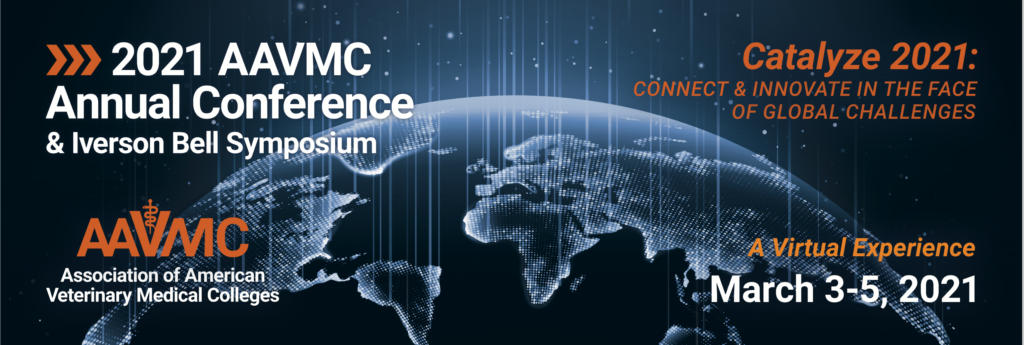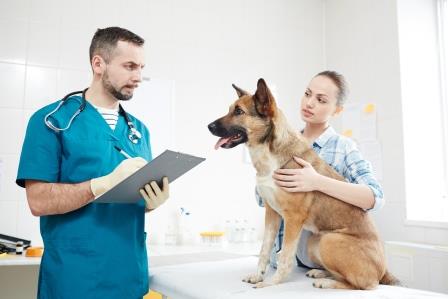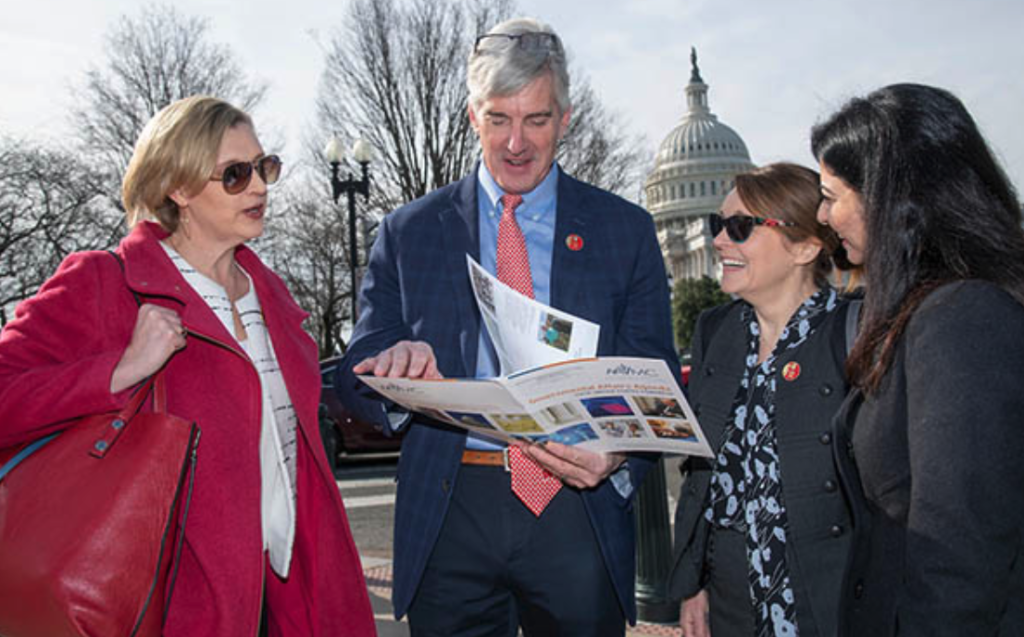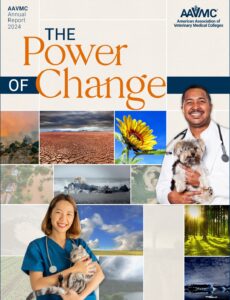AAVMC’s Inaugural Virtual Annual Conference Expected to “Light it Up”

Meeting and conference planners are putting the final touches on the first virtual presentation of an AAVMC annual conference: “Catalyze 2021: Connect & Innovate in the Face of Global Challenges.” The meeting will be held March 3-5 from noon through 6 p.m. daily.
Originally planned for the Watergate Hotel, the pandemic forced AAVMC leaders to make a decision to go virtual early last summer. Since then, conference planners have been busy working with technical production companies to create a high-impact, immersive conference experience for the AAVMC community.
Coordinated by a professional digital meeting company, the virtual conference will include a variety of live and pre-recorded sessions.
A special conference website has been developed, which will serve as a roadmap and resource bank for meeting participants. Almost all presentations made during the meeting will be available for consultation on the site through April 5, 2021.
Respected experts and panelists from around the world will present through 24 break-out sessions offered during three concurrent program sequences and every day will feature a plenary afternoon session and keynote speaker.
The first three hours of the program day will feature presentations and panels on topics such as diversity, equity and inclusion, wellbeing, instructional excellence and other areas. Plenary sessions will get underway at 3 p.m. every day in which AAVMC honorees will be recognized and keynote speakers will be featured.
Three major guest speakers will present during the conference. Massachusetts Institute of Technology (MIT) leadership expert and “question burst” theorist Dr. Hal Gregersen will present the first keynote at 3:15 p.m. on Wednesday, March 3, 2021. On Thursday, March 4 at 3:15, Dr. Jay Dolmage, a professor at the University of Waterloo and author of the acclaimed “Academic Ableism: Disability and Higher Education,” will speak. And on Friday the 5th at 3:15, Robin DiAngelo, author of the New York Times best-selling book “White Fragility: Why it’s So Hard for White People to Talk About Racism,” will present.
DiAngelo’s presentation will not be available on the meeting conference website, according to Conference and Meetings Manager Ms. Leslie Wilson, so those wishing to hear DiAngelo’s remarks will need to attend the live session.
The virtual meeting experience will be enhanced with networking opportunities and innovative features like thematic trivia exercises, a virtual photo booth, coordinated athletic competitions and others.
More than a dozen new video presentations have been produced, featuring 2021 AAVMC professional and service award honorees, as well as the AAVMC’s new strategic plan.
Registration remains open and more information is available through the link.
VMEI Launches: Successful Transitions to Early Career Success
The Veterinary Medical Education Initiative (VMEI) has been established by AAVMC to scan the veterinary medical education continuum and identify potential gaps in the system and opportunities for improvement. Comprised of educators from around the globe, the VMEI has identified the transition to early career success as its initial area of focus.

According to the American Animal Hospital Association, turnover in veterinary practices averages over 20%, which is significantly higher than in other professions. Reports from medical and veterinary employers indicate it can take as much as 18 months for a new graduate to become fully productive. Studies have shown that the stress of the transition to early career can lead to burnout and impact new graduates’ wellbeing and resilience.
The good news is that there are things that the academic and practice communities can do to better prepare and support graduates in these formative early years.
The VMEI will provide an update on its work at the upcoming AAVMC Annual Meeting (March 4, 2021 at 12:00 pm ET). During the session, representatives will discuss the goals of the VMEI, the challenges facing graduates as they transition to early career, and feature exemplars from around the globe who can inform and enlighten thinking about possible ways forward.
Members of the VMEI include Dr. Paul Lunn, chair of the initiative and President-Elect of the AAVMC, North Carolina State University; Dr. Harold Bok, University of Utrecht; Dr. Martin Cake, Murdoch University; Dr. Jennifer Hodgson, Virginia Maryland CVM; Dr. Laura Molgaard, University of Minnesota; Dr. Laura Nelson, North Carolina State University; Dr. Jacquelyn Pelzer, Virginia Maryland CVM; Dr. Susan Rhind, University of Edinburgh; and Dr. Sheena Warman, University of Bristol.
AAVMC Connect System Proving Essential Tool for Pandemic-altered Organizational Life

A year and a half after its introduction, the AAVMC’s “Connect” program is doing the job it was created – and named – to do: bring various AAVMC stakeholders together in dynamic, virtual communities of interest.
As of right now, 42 different committees have been established on the platform, ranging in size and scope from the entire AAVMC Assembly to various committees, governmental structures and interest groups within the association.
“We’ve had a very positive response from our stakeholders about this project,” said Controller and Systems Administrator Mark Stodter, who supervised its development and implementation. “People are using it because it’s user-friendly, powerful and it works. It makes their interface with the AAVMC and each other more effective.”
Since it was created in September 2019, Connect has grown to include 42 different communities and about 5,900 posts have been logged. Connect enables users to discuss projects and topics in real time and store, organize and access information like reports, agendas, PowerPoints and others archived in a variety of different document types. An AAVMC staff member is assigned responsibility to manage each of the communities of interest.
The Connect program has proven especially useful during the pandemic, which has caused many organizations to instantly switch to remote working. Having the Connect platform in place, as well as fully developed cloud computing infrastructure and experience with teleworking, all played a role in helping the AAVMC make such a seamless transition to remote work environments, according to AAVMC CEO Dr. Andrew T. Maccabe.
A new “Volunteer” module will assist the organization and its members better manage volunteer service on programs and initiatives. Connect will also be fully integrated with a new Learning Management System (LMS) that the AAVMC plans to install later this year.
First Virtual Advocacy Day Taking Shape

The annual conference isn’t the only big AAVMC event to be restructured by the global pandemic. Advocacy Day, an annual event which usually takes place in conjunction with the annual conference, has also gone virtual.
Typically, Advocacy Day is a highly choreographed effort which involves a great deal of logistics. Upwards of a hundred people comprised of teams from member institutions usually meet early in the morning for an orientation, then are bused over to Capitol Hill, where they meet with members and staffers throughout the day, sometimes frantically scrambling from government office building to government office building in an effort to meet jam-packed schedules.
Last year, for example, 81 deans and other veterinary medical school representatives from 26 states conducted 156 meetings with Congressional members or staffers to discuss issues of importance to academic veterinary medicine.
The event is annually organized by an AAVMC vendor called “SoapBox,” which helps the AAVMC’s Governmental Affairs office arrange and manage all of the logistics.
Soapbox will again help manage this year’s event, but they are shifting everything to virtual. As of the end of January, 72 institutional representatives from 23 different states had registered to participate in the AAVMC’s virtual Advocacy Day. AAVMC Governmental Affairs Director Kevin Cain expects that to grow in February.
“There is nothing like eye-to-eye, hand-shake to hand-shake personal interaction when it comes to building the kind of relationships we need to in order to advance this profession,” said Cain. “But I’m really excited about what’s taken shape. The same highly qualified institutional representatives are going to meet with the same legislative officials and Members, only this time it will be on a computer screen. We’ve got to get the job done, and in the world we live in, this is the best way to do it. I’m confident this is going to be a big success.”
2021 National Veterinary Summer Scholars Symposium Goes Virtual

As we continue to navigate the ongoing pandemic and public health crisis, the health and safety of our community and stakeholders is of paramount concern. While the release of vaccines has marked a significant advance in this public health crisis, safety and health concerns around large gatherings will likely persist through the summer, if not longer.
The Iowa State University planning team has been working diligently to assess the impact of the ongoing pandemic on the NVSS 2021 and, after careful consideration, has made the decision to present the event virtually this summer.
“It is unfortunate that the 2021 NVSS symposium cannot be held in person but, as members of the veterinary, medical and research communities, it is important that we lead by example and do our part to control the COVID-19 pandemic while continuing to support the next generation of veterinary researchers,” said Dr. Bradley Blitvich, Chair of the Iowa State University Programming Committee. “In the best interest of our students and CVM communities, a virtual symposium was the safest and most sensible decision at this time.”
Boehringer Ingelheim will again support the symposium. “Boehringer Ingelheim is pleased to continue our long tradition of support for One Health and biomedical research as sponsors of this Symposium,” said Roberto Alva, Executive Director, Boehringer Ingelheim Veterinary Scholars program. “Recent events have highlighted the importance of continuing biomedical research efforts, and we look forward to hearing from today’s veterinary students and researchers at the 2021 virtual event.”
Details and additional information on the virtual event will be provided throughout the spring. Please direct any questions to AAVMC Director for Professional Development Dr. Caroline Cantner at ccantner@aavmc.org.
Biden Administration Extends Student Loan Forbearance, Modifies PSLF

One of the first actions taken by the new Biden administration was to provide an extension of the COVID-19 Federal student loan emergency relief flexibilities through September 30, 2021.
These relief measures include suspending loan payments, a 0% interest rate and stopping collections on defaulted loans. Alterations were initially put in place when the pandemic fully erupted in March 2020, extended in August, and again in December.
For those who are pursuing Public Service Loan Forgiveness (PSLF), specific information related to that program is available. Of note is a recent change to the program that allows lump-sum payments and pre-payment in certain circumstances.
The PSLF program has been a critical part of AAVMC advocacy efforts for several years. We are already working with new administration officials at the Department of Education to make sure debt forgiveness programs like PSLF are not adversely impacted by other initiatives.
We continue to work with both the House and Senate to improve the operations of all student loan programs, particularly during the current pandemic.
AVMA/AAVMC Joint Committee Synchronizing Efforts, Approach

Leaders from the AVMA and AAVMC gathered via teleconference for a semi-annual Joint Committee Meeting in December. Comprised of the senior leadership of each organization, the group meets regularly to foster collaboration and advance the profession. Chief on the agenda were several programs related to Diversity, Equity and Inclusion. The group discussed the new AVMA/AAVMC Diversity Commission and AAVMC CEO Dr. Andrew T. Maccabe outlined several outreach initiatives with Historically Black Colleges and Universities (HBCU), Hispanic Serving Institutions, Native American Serving Institutions, Coalition of Urban Serving Universities and others. AAVMC President Dr. Mark Markel discussed efforts to work with the Association of American Veterinary Clinicians and the American Board of Veterinary Specialties to increase DEI within intern and residency programs and veterinary specialty organizations. Designed to foster collaboration and synergy between the AVMA and the AAVMC, the meetings have been held since the founding years of the association.
Board, Assembly Endorse New Statement on Globalization and Internationalization

A new statement developed by the AAVMC’s Task Force on Globalization and Internationalization has been endorsed by the Board of Directors and the Assembly.
“The pandemic we’re struggling with is a powerful example of the need for international collaborations, and not just in science,” said AAVMC Chief Executive Officer Dr. Andrew T. Maccabe. “We live in an inter-connected world in every respect, and we need to approach solving our problems from a global perspective.”
Evolving from a previous statement which was more focused on the accreditation of international institutions, the new statement takes a broader look at the need for fostering and protecting international cooperation in science and public health.
The statement recognizes that animal, human and ecosystem health are “inextricably intertwined” and that solutions for infectious disease, environmental disasters and food disruption problems require an international approach.
That requires international communication channels and the protection of international transportation systems and access.
Academic Veterinary Medicine in the News
Cancer Diagnosis Might Be Wrong for Many English Bulldogs
U.S. News & World Report
No Bad Dogs? Pet Owner’s Personality Can Affect Canine Training Success, Study Finds
NBC News
TikTok Video of Police Dog Arlo Returning Home After Shooting Viewed 41 Million Times
Newsweek
Covid-19 Is Bad News For Wild Gorillas, And Not Just Because They Can Catch It
Forbes
AAVMC Announces 2021 Professional Excellence Award Honorees
EquiManagement
Is COVID-19 Infecting Wild Animals? We’re Testing Species from Bats to Seals to Find Out
The Conversation
Cornell University to Train 1,000 for Nation’s First Public Health Corps
WBNG
UC Davis Receives $3.2 Million Grant to Study Age-related Macular Degeneration
Mirage News
Promising Immune Response to SARS-CoV-2 Developed by Rhesus Monkeys
Newsbeezer
Ready for Veterinary School? Apply Now
Today’s Veterinary Business
Spring Tweaks to COVID-19 Plan are Based on Fall’s Lessons at Cornell
Ithaca Times
Miami Heat Is Using COVID-Sniffing Dogs to Screen Fans. But How Effective Is That?
Press
New Contraceptive Gel Contains Spermicidal, Anti-viral, Libido-enhancing Agents in One Formulation
Sound Health
Ocean Toxin Threatens Sea Otters
Technology Networks
Genetically Modifying Mosquitoes To Control the Zika Virus
Technology Networks
AAVMC Announces Excellence in Research Award Winner
DVM360
K-State Compound Chosen as Potential Treatment Against COVID-19
KSN
How Pets Can Help With Child Mental Health and Development
HuffPost
AVMA Celebrates Black History Month by Highlighting Black Pioneers in Veterinary Medicine
JAVMA News
Veterinary Leaders Discuss How to Combat Racism, be an Ally
JAVMA News
Potential Veterinary Students Face Layered Admission Challenges
JAVMA News
Study Tackles Swallowing and Breathing in Patients with Neurodegenerative Diseases
Columbian Missourian
From Our Members
Circling in on a Vaccine Target for Babesia Bovis
Washington State University
Study Credits Herd Immunity for Stopping Avian Cholera Among Sea Ducks
University of Saskatchewan
Mending the Hearts of a Beloved Dog Breed
Tufts University
One Dog at a Time: Human-animal Bond Drives Public Health in Rural Alaska
Colorado State University
Researchers at Ohio State Are Using Environmental Surveillance to Identify Future Pandemic Threats
Ohio State University
Are COVID-Sniffing Dogs the New Tool in Helping Detect the Virus?
North Carolina State University
WSU Sampling Wastewater to Help Contain Spread of COVID‑19
Washington State University
IDEXX and the Tuskegee University College of Veterinary Medicine Announce Landmark Initiative
Tuskegee University
To see a news feed featuring breaking news from our member institutions, please click here.
People in Motion
Dr. Andrew Parks has been named Interim Associate Dean for Academic Affairs at the University of Georgia.
“Like” us on Facebook or follow us on Twitter, LinkedIn, and Instagram:









SHARE